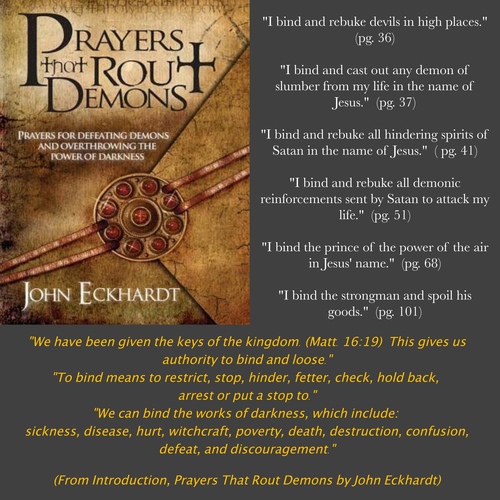“The most widely known – and the most widely misunderstood – concept of spiritual warfare.” Justin Peters
“It sounds like hocus-pocus because it is hocus-pocus.” Jim Osman
The modern church’s belief about what constitutes spiritual warfare is, as Justin Peters remarked, perhaps no better exemplified than by the almost universal, though Scripturally absent, practice of believers “binding Satan” or “binding demons.” A Google inquiry for the phrase “binding Satan” returns over 564,000 hits. A search with the prefatory “how to,” as in “how to bind Satan,” results in over 501,000 digital links. Since the implementation of this maneuver requires prayer, searches for “binding Satan prayers” or “binding demons prayers” yields 420,000 hits for the former and 346,000 for the latter.
Popular interest in this maneuver is clearly impressive and, sadly, it reflects the biblical ignorance that itself is the modern church’s most pervasive malady. The notion of binding  Satan exudes a pernicious presumption of the Devil’s ubiquity, attributing to him an omnipresent characteristic exclusive to God. The perception is given that his powers, particularly over the blood-bought chosen and redeemed of Christ, are nearly insurmountable, save for the mystical incantations and presumed authority of believers this false form of spiritual warfare teaches.
Satan exudes a pernicious presumption of the Devil’s ubiquity, attributing to him an omnipresent characteristic exclusive to God. The perception is given that his powers, particularly over the blood-bought chosen and redeemed of Christ, are nearly insurmountable, save for the mystical incantations and presumed authority of believers this false form of spiritual warfare teaches.
While it helps fill pews, sell books, and provides an appealing mystique of spiritual and mystical melodrama, this false teaching of spiritual warfare is something few believers seem to recognize as erroneous. Apparently few pastors, churches, and denominations bother to teach the actual Biblical responsibilities and engagement believers are to use in authentic spiritual warfare. It’s just much simpler to let fallacies persist than to do the hard job of rightly handling the word of truth (2 Timothy 2:15) and obediently feeding Christ’s sheep. (John 21:17)
Yet a simple reading of Scripture and the application of just a bit of common sense would do much to aid believers in avoiding the pitfalls of spiritually toxic teachings, particularly those within the realm of spiritual warfare.
“Common sense goes a long way in dispelling a lot of these myths, aside from the theology.” Justin Peters
Consider one example drawn from applying common sense to Scripture.

Of the thirteen epistles penned by the apostle Paul, his second letter to the young Timothy was the last one he wrote that is included in the New Testament canon. Scholarship dates this letter to 66 or 67 AD, being penned by Paul as he was imprisoned in Nero’s Rome and facing certain martyrdom. This letter doesn’t find the apostle expounding doctrinal details or combatting fresh born heresies. It finds him passing on, for the last time, a word of encouragement and exhortation as the mantle of Paul’s ministry was being handed off to Timothy, his “beloved child.” (2 Timothy 1:2)
Given the simple context of these known circumstances in which Paul penned this inspired, final epistle, we can assume that Paul is going to write on matters of the utmost importance to Timothy. He’s going to emphasize the most critical things to which the young minister ought pay heed. What Paul writes, then, and, notably, what he doesn’t write, is particularly instructive for us.
So what does he emphasize and omit in his letter to Timothy? Paul, “bound with chains as a criminal” (2 Timothy 2:9), encourages Timothy to persevere in the faith, to “not be ashamed of the testimony about our Lord,” (2 Timothy 1:8), to “be strengthened by the grace that is in Christ Jesus” (2 Timothy 2:1) and to be diligent to “present yourself to God as one approved, rightly handling the word of truth” (2 Timothy 2:15) It was on this “word of truth” that Paul would elaborate in two verses (that ought to be) well-known to Christians.
“All Scripture is breathed out by God and profitable for teaching, for reproof, for correction, and for training in righteousness, that the man of God may be complete, equipped for every good work.” 2 Timothy 3:16-17
But it’s just a few verses prior to this testimony about the divine nature of Scripture that Paul issues instructions to Timothy regarding his young protege’s faith and ministry. The opening words of the chapter three find Paul reminding Timothy, “in the last days there will come times of difficulty.” (2 Timothy 3:1) Keep in mind, these words from Paul were coming as he was “in chains” in Rome awaiting execution, so the warning was a sober and imminent one for Timothy.
The apostle follows this warning with the examples from which increased difficulty and persecution could be evidenced. 2 Timothy 3:2-9 is a catalog of the human depravity that would accompany the “times of difficulty” and fuel a hatred for the faith of Christ, by men who “oppose the truth, men corrupted in mind and disqualified regarding the faith.” (2 Timothy 3:8)
Directly following this warning of the epic evil and the increasing difficulties Timothy should expect Paul launches into his testimony about the inspiration of Scripture. That may seem superficially curious. Why issue such a pragmatic and dire warning to then launch into the theopneustos nature of Scripture? Is Paul veering off onto some unrelated tangent in his commentary?
Hardly. This is no distracted rabbit-chase coming from the mind of the imprisoned, suffering Paul. It is intentionally the response he is teaching Timothy (and, by extension, us) to have in response to persecuting difficulties as a godless world spirals ever further into depravity. The believer must be firmly established in the faith which has been sovereignly gifted by God, and in its teaching and doctrine that have been providentially transmitted to us within the “God-breathed” truth of Holy Scripture.
“But as for you, continue in what you have learned and have firmly believed, knowing from whom you leaned it and how from childhood you have been acquainted with the sacred writings, which are able to make you wise for salvation in Christ Jesus.” 2 Timothy 3:14-15
While logic dictates that this apostle and his disciple Timothy had to be huge targets for spiritual attacks of the enemy, and knowing of Paul’s Scripturally infamous “thorn in the flesh, a messenger of Satan to harass me, to keep me from becoming conceited” (2 Corinthians 12:7), do you see in this last letter from the soon-to-be-martyred apostle anything remotely resembling modern day maneuvers of spiritual warfare? There is no hedge building, apostolic prayer guideline; no reminder on how Timothy must always remember to bind Satan; no “don’t forget to bind the territorial demons of Ephesus before your Sunday morning worship services.”
But, according to the tone of the Satan-binding form of spiritual warfare so common today, shouldn’t these things be expected from Paul? To warn and remind Timothy how to deal with the devil so that the ministry might go forward? Is this, though, what Paul did?
No.
Instead, Paul simply drives Timothy to the Word, a paramount reminder for us of the centrality the sufficient, sacred Scripture must have in our lives as believers. “I charge you in the presence of God and of Christ Jesus, who is to judge the living and the dead, and by his appearing and his kingdom: preach the word.” 2 Timothy 4:1-2
If Paul didn’t, in his final letter to Timothy – nor elsewhere in any of his writings, much less any other inspired author of any portion of Scripture – teach the practice of binding Satan, then from what source does this false maneuver of spiritual warfare arise?
 Pastor and author Jim Osman discusses this “binding Satan” teaching on The Justin Peters Program in which the two focus on the rampant and erroneous teaching of spiritual warfare that plagues the modern church. Acknowledging that “this is not restricted to charismatic or word-faith circles,” Osman points out that this faulty “binding” teaching has “made its way into all corners of the church.”
Pastor and author Jim Osman discusses this “binding Satan” teaching on The Justin Peters Program in which the two focus on the rampant and erroneous teaching of spiritual warfare that plagues the modern church. Acknowledging that “this is not restricted to charismatic or word-faith circles,” Osman points out that this faulty “binding” teaching has “made its way into all corners of the church.”
Peters agrees. “Thirty or so years ago, this notion of binding Satan, of rebuking Satan, would have been relegated to the charismatic churches, to the word-faith churches, to what would become the New Apostolic Reformation – these more wild-eyed charismatics – but not so any more. This is mainstream. This is in Southern Baptist Churches.” “Binding Satan” has become a staple in the vernacular of spiritual warfare across the evangelical church.
“The belief is that by saying the words ‘I bind you Satan’ … that is, addressing Satan himself and praying to him – which should bring a shudder down the spine of every believer” explains Osman, “by praying or uttering words to Satan, or just by declaring or pronouncing with our own words, we can hinder his influence, his power and his authority.”
In his book, Truth or Territory: A Biblical Approach to Spiritual Warfare, Osman defines what this “binding” is.
“It is believed that by binding Satan, his activity is limited, hindered, or prohibited in the sphere in which he is bound. For instance, a person might pray that Satan will be bound from blinding a person to whom they wish to present the gospel with the belief that this will improve the likelihood that the person will trust Christ as Savior. Someone might pray that Satan would be bound from a certain event (concert, worship service, etc.) and thus prohibited from having any influence or power over that event. Or someone might pray that Satan be bound from a geographical location ( a new house, a neighborhood, a church, bedroom, workplace, or hotel room) with the belief that uttering such a prayer cripples Satan’s ability to interfere or enter.”
The purveyors of this flawed teaching incorrectly use Scripture to validate it. The key passages, cited below, are taken out of context in order to fabricate a presumed spiritual maneuver which believers are to implement in presumed authority over Satan and his demons. As Osman says, “Though the language of ‘binding’ is present in each verse, it has nothing to do with spiritual warfare. ”
“Or how can someone enter a strong man’s house and plunder his goods, unless he first binds the strong man? Then indeed he may plunder his house.” Matthew 12:2
 “I will give you the keys of the kingdom of heaven, and whatever you bind on earth shall be bound in heaven, and whatever you loose on earth shall be loosed in heaven.” Matthew 16:19
“I will give you the keys of the kingdom of heaven, and whatever you bind on earth shall be bound in heaven, and whatever you loose on earth shall be loosed in heaven.” Matthew 16:19
“Truly, I say to you, whatever you bind on earth shall be bound in heaven, and whatever you loose on earth shall be loosed in heaven.” Matthew 18:18
In the radio broadcast with Peters (the audio is included below) , and in greater detail in his book, Osman dismantles the faulty exegesis of these verses as they are used to justify the illicit maneuver of binding Satan. In the broadest sense, though, the fundamental problem with the use of these verses is that they are drawn from portions of Scripture that are historical narratives, not from Scripture that is didactic, that is, intended to instruct believers. These verses are drawn from Scripture that is giving us an historical account of events. Spiritual warfare is not the topic of any of these narrative accounts.
Peters emphasizes this point to his listeners.
“This is where so many people go off into the weeds because they read the entire Bible as if it’s prescriptive. Obviously there are prescriptive parts of the Bible, but there are also descriptive parts that are describing real events in history, but that are not to be assumed as repeated, or to be normative for the Christian life.” Justin Peters
In the case of these “binding Satan” proof-texts, Osman confirms that “Jesus is not prescribing to us a method of spiritual warfare. This is not a tool in our spiritual warfare arsenal.” In the case of the “binding the strongman” text from Matthew 12:29 Osman says, “It is an analogy that describes His historic confrontation with the forces of darkness – a unique, once-for-all confrontation with Satan – and a defeat of Satan’s kingdom and a plundering of that which belonged to Satan as Jesus takes and sets the captives free.”
 In the case of the other two verses, Osman writes, “binding” and “loosing” are used in exactly the same way.” In Matthew 16:19, the context is Christ responding to Peter’s confession of His identity, “You are the Christ, the son of the Living God.” (Matthew 16:16), not spiritual warfare. In citing the Theological Dictionary of the New Testament, Osman quotes, “Jesus does not give to Peter and the other disciples any power to enchant or to free by magic. The customary meaning of the Rabbinic expressions [Binding and Loosing] is equally incontestable, namely to declare forbidden or permitted, and thus to impose or remove an obligation, by a doctrinal decision.”
In the case of the other two verses, Osman writes, “binding” and “loosing” are used in exactly the same way.” In Matthew 16:19, the context is Christ responding to Peter’s confession of His identity, “You are the Christ, the son of the Living God.” (Matthew 16:16), not spiritual warfare. In citing the Theological Dictionary of the New Testament, Osman quotes, “Jesus does not give to Peter and the other disciples any power to enchant or to free by magic. The customary meaning of the Rabbinic expressions [Binding and Loosing] is equally incontestable, namely to declare forbidden or permitted, and thus to impose or remove an obligation, by a doctrinal decision.”
In Matthew 18:18, in which the context is about church discipline, the terms “binding” and “loosing” also imply not new supernatural abilities given to the disciples, but rather their authority to proclaim matters about which heaven has already determined. As Osman writes, “A literal, but awkward translation [of these phrases] into English would read, ‘…whatever you bind on earth is that which shall already have been bound in the heavens, and whatever you loose on earth is that which shall already have been loosed in the heavens.”
Osman elaborates in his book on the following five points as to the practical and logical problems with the false teaching of binding Satan.
“First, spiritual warfare teachers who advocate binding Satan based upon these passages utter nary a word about the ‘loosing’ part of the verses. Yet the same passages that supposedly give authority to bind Satan mention loosing as well. In their theology, to what could this possibly refer?”
“Second, there is no single example anywhere in the Bible where an apostle or a prophet bound Satan. We never hear Jesus utter these words. We have a number of prayers recorded in the New Testament and not once do we read of them ‘binding Satan.”
“Third, Scripture describes Satan as ‘roaming about,’ not bound by believers. (1 Peter 5:8)
“Fourth, the only time that Scripture says that Satan is bound is during the 1,000-year millennial reign of Christ after this present age.” (Revelation 20:1-10)
“Fifth, this practice doesn’t even pass the ‘common sense test.” For instance, how long does this binding last? Apparently, the binding is not permanent, since it needs to be done before every service, every special event, or witness encounter.”
Peters sardonically posits perhaps the most obvious question related to this Biblically unprescribed maneuver: “If we could bind Satan, why not bind him permanently from all people from all places for the rest of eternity?” But, as Osman jocularly states, “There are no ropes or handcuffs or chains in the armor of God.”
Listen below to Justin Peters & Jim Osman from The Justin Peters Program.
Spiritual Warfare: Binding Satan
See More From This Series With Justin Peters and Jim Osman:
Spiritual Warfare From A Biblical Approach
Spiritual Warfare: It’s About Gospel Truth, Not Spiritual Territory
Spiritual Warfare: Protection From Satan with Shrubbery
Spiritual Warfare: Generational Curses
The Justin Peters Program is copyrighted and broadcast by WorldView Weekend and his ministry’s website is Justin Peters Ministries.
For Jim Osman’s book, please go to TruthorTerritory.com
(We gratefully acknowledge the permission granted by Justin Peters, Jim Osman, and Worldview Weekend to cite materials under their respective copyrights.)
[Contributed by Bud Ahlheim]












